If you’ve been paying attention to the news, you know that Venezuela is having an economic and social crisis of epic proportions. Why is this important for my Ecuadorian Blog? Because every day I see these immigrants, who have left their families, their homes, and their lives back in Venezuela. They have walked through Columbia and have arrived in Ecuador with only a bag of posessions. They are traveling the PanAmerican Highway through my city of Ibarra, on their way to Peru, which has opened its doors to them. I decided that I would be terribly amiss if I didn’t include some information about them in my experience here in Ecuador. However, I’m not sure I even understand all that is happening and changing on a daily basis for these desperate people, so I thought I’d give you a little summary straight from a variety of sources on the Internet:
Fri 10 Aug 2018, by Tom Phillips
More than Half a Million Venezuelans Fled to Ecuador this Year, UN says
In reaction to this, the Ecuador government required Venezuelan immigrants to have passports to enter this country, but that didn’t last long.
25 November, 2018
Ecuador seeks $550 Million to Help Venezuelan Migrants Fleeing Crisis
Each day, more and more were coming. And then this happened.
Mon 21 Jan 2019 by Joe Parkin Daniels
Ecuador targets Venezuelan migrants after woman’s death.Crackdown announced amid outrage over killing as Venezuelan man is held
Immediately, many immigrants turned around and found their way back to the Columbia border and safety. Others, asked for help to get home, or to get on with their journey… anything to get out of Ecuador. To help them, the government of Venezuela paid for private airplanes to return willing immigrants to Venezuela while a non-profit organization paid for busses to transport the immigrants from the Columbia border, through Ecuador and into Peru. Since that week, I’ve seen very few Venezuelan immigrants around town. They’re too scared to come back.
Here is another excerpt off the internet from last week:
However, the murder of this young woman highlights the real crisis that Latin America is experiencing, nowadays, considered the region with the highest rates of gender violence with an average of nine women murdered per day.
This is also true. In the last few days, another woman was sexually assaulted by her male “friends” in Quito and it turned into a high-profile plea to stop the madness. Women and families all over Ecuador took to the streets to protest and delivered a backlash to the xenophobic response of blaming the Venezuelans. The real problem isn’t the immigrants, it’s the machismo culture.
As all of this transpired in our community, it was decided at our school (by either parents, students or administrators) that the voice of Teodoro Gomez de la Torre must be heard. They decided to take a day for a peaceful march in mourning to honor the woman killed in Ibarra, as well as the fight for peace, respect, and safety of all women.
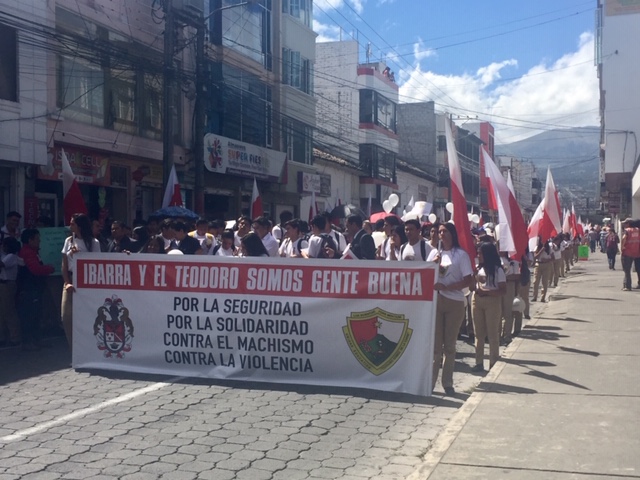 |
| Leading the Peace March was this banner: “Ibarra and Teodoro are Good People For the Security Through Solidarity Against Machismo Against Violence” |
 |
| Each class carried their own banner and all the students wore a black ribbon to remember the death of these women. “Senior E Class, For Peace” |
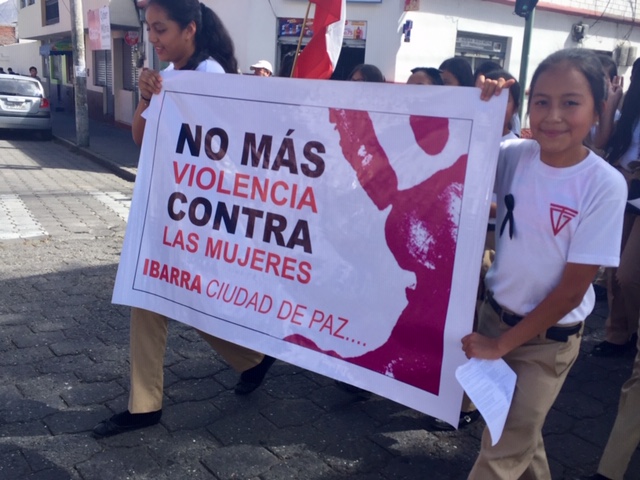 |
| “No More Violence Against Women, Ibarra City of Peace” |
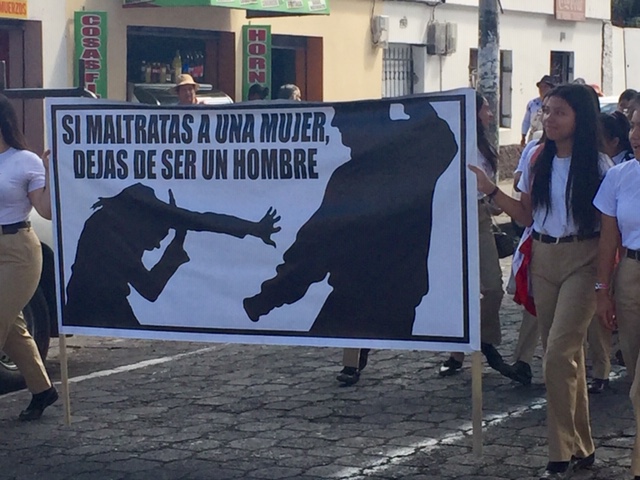 |
| “If you abuse a woman, you stop being a man” |
 |
| “Ibarra in Mourning, No to Xenophobia” |
 |
| “I firmly believe that respecting diversity is a fundamental pillar in the eradication of racism, xenophobia and intolerance. – Rigoberta Menchú – Sophomore Class A” |
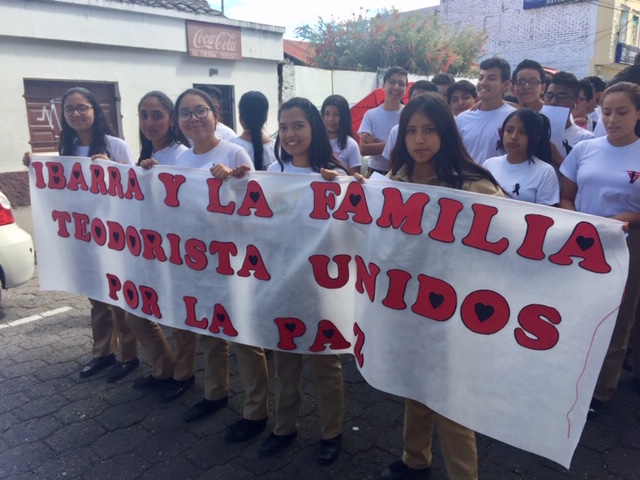 |
| My International Baccalaureate Class carried their banner proudly: “Ibarra and the Teodoro Family United for Peace” |
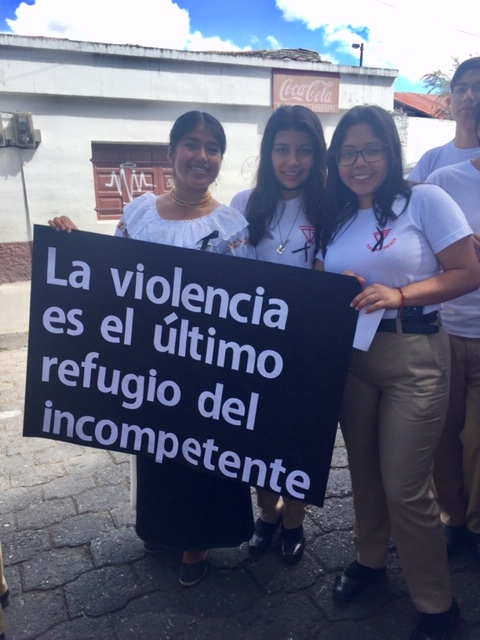 |
| “Violence is the Ultimate Refuge for Incompetence” |
 |
| “Against Machismo” |
 |
| “We want to live free, without fear, without blows that hurt or words that injure.” “Let’s fight for life, not one less” |
I was really proud of the staff and students of my school. I hope they are internalizing these messages and will continue the work to make the world a better and safer place for everyone in the future.
Unfortunately, the Venezuelans are not safe, and their situation continues to get worse. Because of this recent homicide, the Ecuadorian government is demanding that Venezuelan Immigrants present their criminal records in order to enter Ecuador, which is causing a whole new set of problems for these poor and desperate people.
Furthermore, as things currently stand, Nicolás Maduro, the president of Venezuela, has refused to concede that his re-election was a sham. Many other countries however, have already recognized Juan Guaidó as a new interim president of Venezuela, and are asking Maduro to step down. But Maduro won’t step down, leaving Guaidó powerless to do much. International organizations are trying to help get aid to the people in Venezuela. But now Maduro is closing the borders and is not allowing food, water and medicine to enter his country. Venezuela is in complete turmoil, the borders have turned violent, and nobody knows what will happen next. In the meantime, the street corners around Ibarra still seem empty.
My friend and fellow Peace Corps Volunteer Alex Ogle (TX) interviewed some immigrants he met in the streets and painted their images and representations of their experiences. Last night, he held an exhibition of his paintings at a local cafe in Ibarra and opening night was packed with many locals. I’m really proud of his efforts to create more awareness on the plight and flight of these people.
Over the months of living here, I’ve befriended an owner of a small restaurant. His name is Francisco, and he’s from Venezuela. When all of this happened, he closed his restaurant doors, and I haven’t seen him since. I hope Francisco is safe. I hope he has a place to sleep. I hope he isn’t hungry… wherever he is.

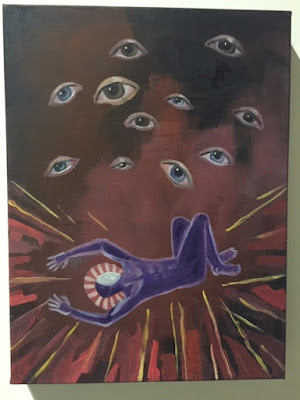
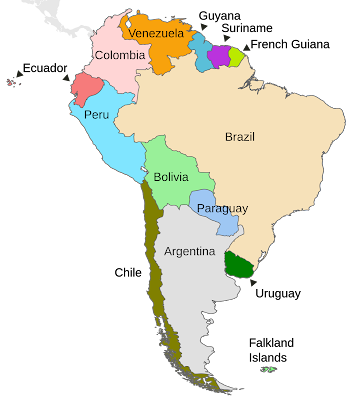

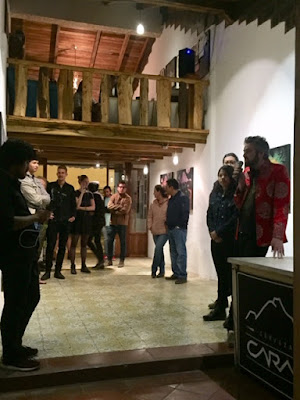

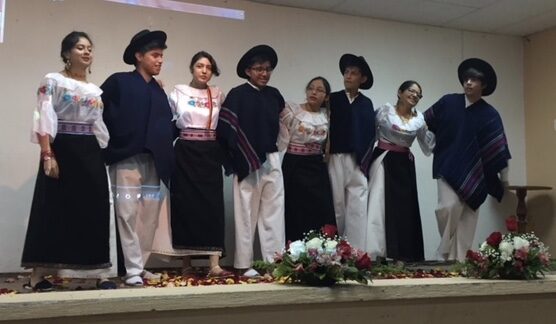
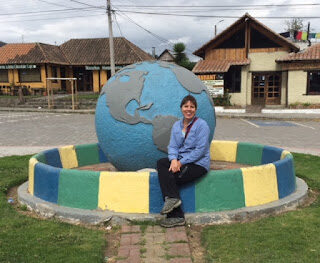
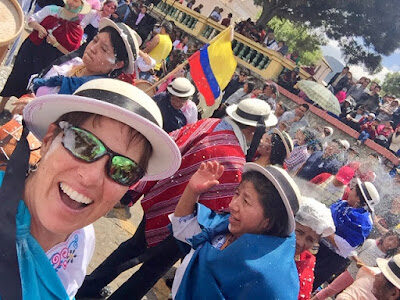
Ms. Long
Thank you for informing us about what's going on in your area of the world. It's wonderful to see the students take action about such an important topic.
Unknown
Thank you so much Becky for this super important message. I love reading all of your stories, and this is one of the most important ones.
Unknown
by the way, it's Racheli Ross. I guess I have to create a profile or something…:)